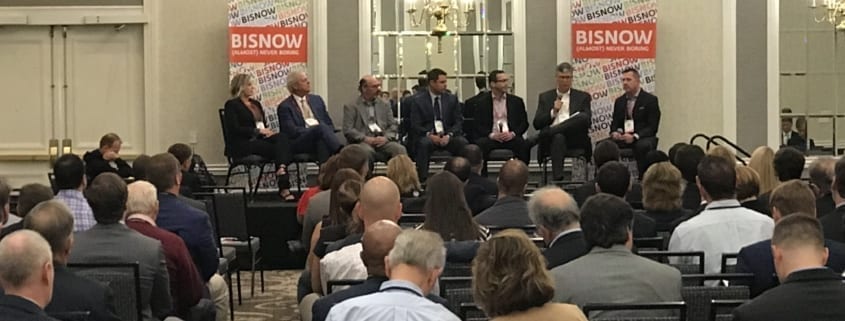Bisnow’s Charlotte Multifamily Boom – See What You Missed!
The IMS team had the pleasure of speaking and exhibiting at an event right in our backyard this month. Bisnow hosted the “Charlotte Multifamily Boom! – Investment, Development, Finance and Design” in Uptown Charlotte last week. According to a report by Zillow, Charlotte will be the #4 hottest US housing market in 2018. And with 23,500 multifamily units built, under construction, or in the pipeline since 2017, you can see why real estate investment, development, and finance communities are excited about this market.
While the velocity at which these units are being built may slow a bit, there is certainly no immediate end in sight according to a study commissioned by NMHC and NAA. The report claims Charlotte will need 71,523 new apartments between 2017-2030, so the Charlotte market still has plenty to offer the prospective investor in the years to come. Ron Rossi, the VP of Business Development at IMS, moderated a panel that covered that very topic. “Investment Strategies in a Booming Market” was the first panel of the day and was composed of a group of six with varying experience and perspectives on this subject.
Continue reading below for our key takeaways from the discussion.
Investment Strategies in a Booming Market
Moderator:
Ron Rossi – Vice President of Business Development – IMS
Panel:
Andy Andrews – Chairman & CEO – Dominion Realty Partners
Lisa Taylor – Senior Managing Director – Greystar
Scott Wilkerson – Chief Investment Officer – Ginkgo Residential
Jonathan Mettel – Vice President – Hunt Mortgage Group
Brett McGuire – Senior Vice President – Walker & Dunlop
Neil Beldock – Senior Executive – Originations & Operations – Pender Capital
One topic on everyone’s mind as markets mature is where the future opportunities will be. According to Jonathan Mettel, “Charlotte can’t keep building high-end apartments in uptown; growth towards the suburbs is coming.” Class A luxury apartments in the city don’t satisfy the needs of the entire market. There are demographics with requirements that are underserved at this point. Charlotte is in need of class B apartments, student housing, and more affordable units. Scott Wilkerson and his business currently have a heavy focus on value-add investments. According to Scott, “Competition is increasing in the value-add space of lower price rent communities in high demand areas. It’s not always pretty, and not necessarily something you want to put on a brochure, but it works quite well for lower-income families and Millennials.”
Another discussion that always comes to the forefront as cities rapidly expand is the question of whether the city’s infrastructure is built to handle an increasing population. Things like traffic and accessibility to public transportation play a big role in where people want to live. Neil Beldlock points to Los Angeles as a prime example of why this is such an important topic to consider. “LA can be used as an example for any high-growth city situation. LA looked to have perfect infrastructure post WW2, but now it’s a disaster. It had the freeways, the public transit, it seemed well organized. Now it can take you an hour to go four blocks.” He continued to emphasize the magnitude of the responsibility that city planning committees have when it comes to this issue. They need to take a long hard look at the failings of cities like LA, Atlanta, or Washington D.C. to figure out how they can preemptively solve some of these problems.
Lastly, there was a brief conversation about the willingness of the banks to issue loans as the market tightens. It seemed to be a group consensus that deals today have much more equity and much less debt than they did in the past, and they have only 50- 60% debt. If you have at least 35% equity in the deal, banks are much more confident in your ability to pay back that banknote regardless of good times or bad.
Looking for more updates on the commercial real estate market? Check out this free on-demand webinar with NREI on The Future of Commercial Real Estate: Market Dynamics and Technology Trends.











